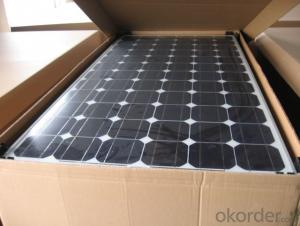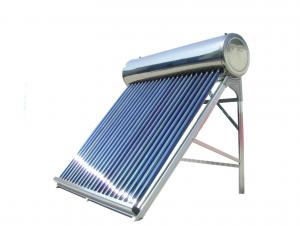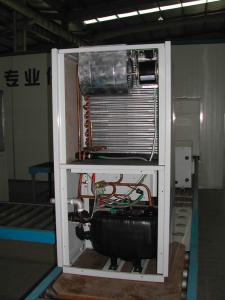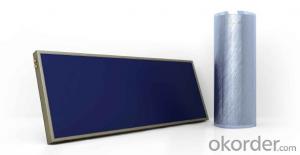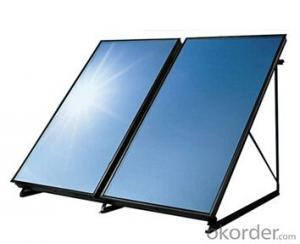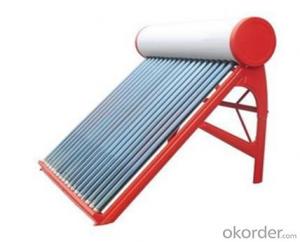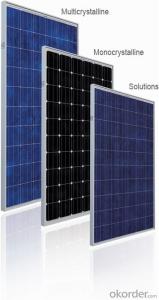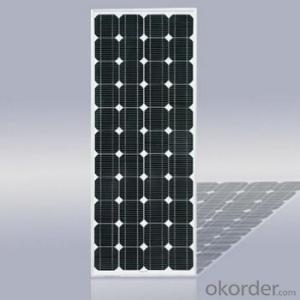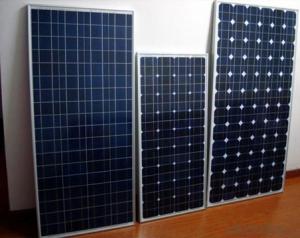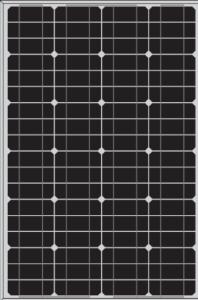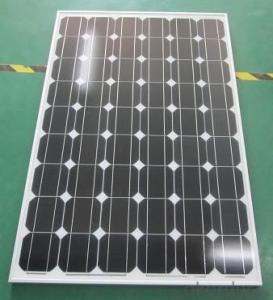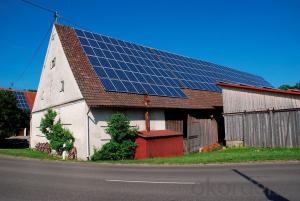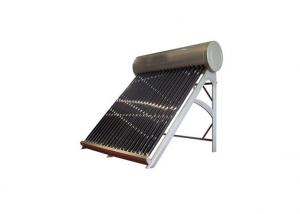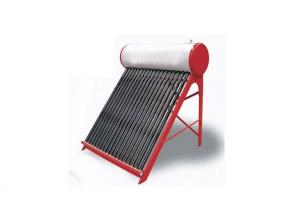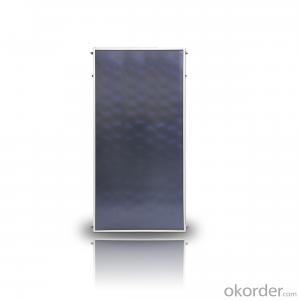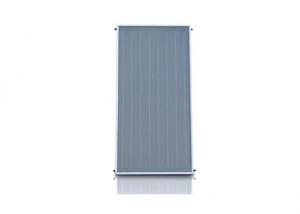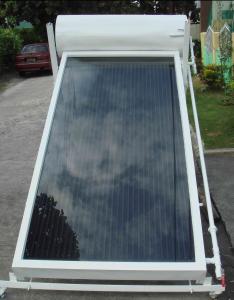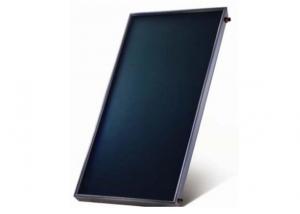CNBM Solar Monocrystalline Series Panels for Solar Water Heater for Chickens
- Loading Port:
- Tianjin
- Payment Terms:
- TT OR LC
- Min Order Qty:
- 1 pallet
- Supply Capability:
- 100000000 pallet/month
OKorder Service Pledge
OKorder Financial Service
You Might Also Like
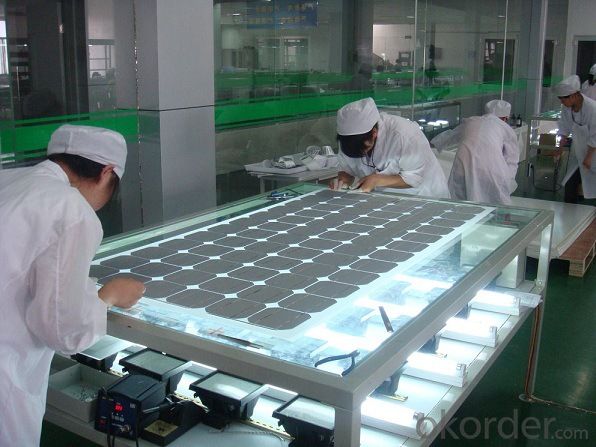
Product Description:
Solar Monocrystalline Series Panels
Introduction of Solar Monocrystalline Series Panels
CNBM Solar photovoltaic (PV) Panel is designed for large electrical power requirements. It is the optimal choice for both on-grid and off-grid power systems. CNBM Solar panel offers high performance of power per square foot of solar array. Monocrystalline silicon(c-Si): often made using the Czochralski process. Single-crystal wafer cells tend to be expensive, and because they are cut from cylindrical ingots, do not completely cover a square solar cell module without a substantial waste of refined silicon. Hence most c-Si panels have uncovered gaps at the four corners of the cells.
Characteristics of Solar Monocrystalline Series Panels
I Solar Cell : High efficiency crystalline solar cell. Even if under the weak light, the solar module can produce maximum power output.
II Tempered glass (toughened glass): Anti-reflecting coating and high transmission rate glass increase the power output and mechanical strength of solar module.
III EVA and TPT: Using high quality EVA and TPT to prevent destroying and water.
IV AI frame: Without screw, corner connection. 6 holes on the frame can be installed easily.
V Junction box: Multi function junction box with water proof.
VI Long lifetime: ≥25 years; Less power decrease
VII Good performance of preventing from atrocious weather such as wind and hails.
VIII Resisting moisture and etching effectively, not effected by geology.
Standard Test Conditions of Solar Monocrystalline Series Panels
The opto-electrical specifications shown below are stabilized values being measured at Standard Test Conditions, Irradiance: 1000W/m2, Spectrum: AM1.5 at 25°C, The info below is subject to manufacturing tolerances. Where appropriate minutes of measurement are available and are used for the dimensioning of the installation.
Advantages of Solar Monocrystalline Series Panels
• CNBM Solar performance guarantees for 25 years
• 12 years guarantee for workmanship
• Timeliness of delivery
CNBM International Corporation's products including Monocrystalline Solar Panel, Polycrystalline Solar Panel have received and enjoyed famous reputation in many countries and regions in the world .As a solar panel supplier in China, we strive to provide our customers with excellent service, superior products and unmatched value.
Characteristics of Solar Monocrystalline Series Panels
Max Power Voltage Vmp (V) | 18.4V | 17.6V |
Max Power Current Imp (A) | 6.52A | 7.39A |
Open Circuit Voltage Voc (V) | 23.0V | 22.2V |
Short Circuit Current Isc (A) | 6.97A | 7.90A |
Max Power Pm (W) | 120W | 130W |
Temperature Coefficient of Cells
NOCT | 47℃±2℃ |
Temperature Coefficients of Isc (%/℃) | 0.064 |
Temperature Coefficients of Voc (%/℃) | -0.33 |
Temperature Coefficients of Pmp (%/℃) | -0.45 |
Mechanical Data Solar Monocrystalline Series
Power | 120W/130W |
Dimension | 1190/1470×670×30mm |
Weight | 9.5kg/11.7kg |
Tolerance | ±3% |
The dimension of the modules can be changed according to the demand of clients
Limits
Operating Temperature | –40 °C to +85°C |
Storage Temperature | –40 °C to +85°C |
Max System Voltage | 700V |
Guarantee Solar Monocrystalline Series Panels
Products Guarantee | 10 yrs free from defects in materials and workmanship |
Performance Guarantee | No less than 90% within 10yrs and no less than 80% within 25yrs |
Certificates | IEC, ISO, TUV, CE |
FAQ
We have organized several common questions for our clients,may help you sincerely:
1. What’s price per watt?
A: It’s depends on the quantity, delivery date and payment terms of the order. We can talk further about the detail price issue. Our products is high quality with lower price level.
2. Can you tell me the parameter of your solar panels?
We have different series of cells with different power output, both from c-si to a-si. Please take our specification sheet for your reference.
3. How do you pack your products?
We have rich experience on how to pack the panels to make sure the safety on shipment when it arrives at the destination.
4. Can you do OEM for us?
Yes, we can.
5. How long can we receive the product after purchase?
In the purchase of product within three working days, We will arrange the factory delivery as soon as possible. The perfect time of receiving is related to the state and position of customers. Commonly 7 to 10 working days can be served.
- Q: What are the different materials used in the construction of solar water heaters?
- Solar water heaters are constructed using a variety of materials to ensure efficient heat absorption and retention. The key components of a solar water heater include the collector, storage tank, and piping system. The collector, which is responsible for absorbing solar energy, is typically made of materials with high thermal conductivity such as copper or aluminum. Copper is a popular choice due to its excellent heat transfer properties and resistance to corrosion. Aluminum, on the other hand, is lightweight and cost-effective, making it a common alternative. The storage tank, where the heated water is stored for later use, is commonly made of glass-lined steel or stainless steel. Glass-lined steel tanks are durable and have good insulation properties, preventing heat loss. Stainless steel tanks are known for their longevity and resistance to corrosion, making them a reliable choice for long-term use. The piping system, which connects the collector to the storage tank, is usually made of copper or plastic materials. Copper pipes are often used due to their high thermal conductivity and durability. Plastic pipes, such as cross-linked polyethylene (PEX), are becoming more popular due to their flexibility, ease of installation, and resistance to corrosion. In addition to these primary materials, solar water heaters may also include insulation materials such as polyurethane foam or fiberglass to minimize heat loss. These materials provide thermal insulation and help maintain the temperature of the water inside the storage tank. Overall, the use of these different materials in the construction of solar water heaters ensures efficient heat absorption, retention, and durability, contributing to the overall effectiveness and longevity of the system.
- Q: Can a solar water heater be used with hard water?
- Yes, a solar water heater can be used with hard water. However, it is important to note that the presence of hard water can have adverse effects on the performance and lifespan of the solar water heater. Hard water contains a high concentration of minerals such as calcium and magnesium, which can accumulate and form mineral deposits inside the water heater. Over time, these deposits can reduce the efficiency of the solar panels and heat exchanger, leading to decreased heating capacity and potentially causing damage. To mitigate the effects of hard water, it is recommended to install a water softener or a descaling system in conjunction with the solar water heater. These systems work by removing or reducing the mineral content of the water, preventing the formation of mineral deposits and ensuring optimal performance of the solar water heater. Regular maintenance and cleaning of the solar water heater, including flushing the system and descaling as necessary, is also crucial when using hard water. This will help to minimize the accumulation of minerals and maintain the efficiency and longevity of the system. In summary, while a solar water heater can function with hard water, it is important to take preventive measures such as installing water softeners and performing regular maintenance to ensure optimal performance and longevity of the system.
- Q: Buy solar water heater enough to wash five people how much money
- At present, in the case of quality assurance, the general single warehouse outside the market in the 110-180 yuan / tube, because dealers are different, so the price is different,
- Q: Can a solar water heater be used in areas with high pollution levels?
- Yes, a solar water heater can still be used in areas with high pollution levels. While high pollution levels may slightly reduce the efficiency of the solar panels due to reduced sunlight reaching the surface, solar water heaters can still function and provide hot water. However, regular cleaning and maintenance of the panels may be required to ensure optimal performance in polluted areas.
- Q: How does the control system of a solar water heater compare to a traditional water heating system?
- The control system of a solar water heater differs from a traditional water heating system as it primarily relies on sensors and controllers to monitor and regulate the temperature of the water. It automatically adjusts the flow of water and directs it through the solar collectors for heating. In contrast, a traditional water heating system typically uses manual controls such as thermostats and pressure valves to maintain the desired temperature. Additionally, the control system of a solar water heater is designed to optimize energy efficiency by utilizing solar power, whereas a traditional system may rely on gas or electricity for heating.
- Q: What is the expected lifespan of the solar collector in a solar water heater?
- The expected lifespan of a solar collector in a solar water heater can vary depending on factors such as quality, maintenance, and usage. However, on average, a well-maintained and properly installed solar collector can last anywhere between 20 to 30 years.
- Q: What is the role of the solar water heater's reflector
- Solar vacuum heat collection tube, because of installation, sealing and other reasons. It can not be arranged closely
- Q: What is the required maintenance cost for a solar water heater per year on average?
- The required maintenance cost for a solar water heater per year on average can vary depending on the specific model and location, but it typically ranges from $100 to $300.
- Q: Are there any limitations on the size of a solar water heater?
- Yes, there are limitations on the size of a solar water heater. The size of a solar water heater is usually determined by factors such as the available space for installation, the amount of hot water required, and the solar energy potential in the location. Additionally, larger solar water heaters may require more complex and costly installation and maintenance.
- Q: Can a solar water heater be used in areas with limited access to energy conservation initiatives?
- Yes, a solar water heater can be used in areas with limited access to energy conservation initiatives. Solar water heaters do not require a continuous supply of electricity and can function independently. They utilize the sun's energy to heat water, making them a sustainable and cost-effective option for areas with limited access to energy conservation initiatives.
Send your message to us
CNBM Solar Monocrystalline Series Panels for Solar Water Heater for Chickens
- Loading Port:
- Tianjin
- Payment Terms:
- TT OR LC
- Min Order Qty:
- 1 pallet
- Supply Capability:
- 100000000 pallet/month
OKorder Service Pledge
OKorder Financial Service
Similar products
Hot products
Hot Searches
Related keywords
